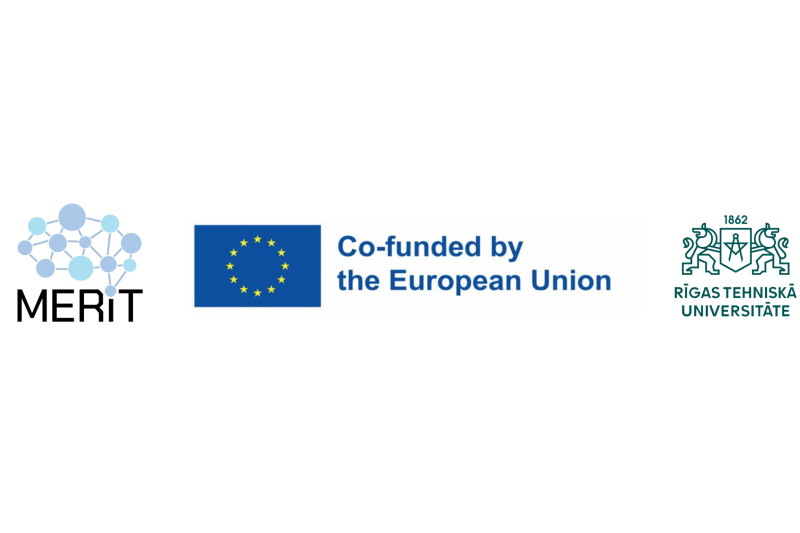MERIT:
Management of Smart, Resilient,
and Interconnected Systems
MERIT:
Management of Smart, Resilient,
and Interconnected Systems
Information Technology Governance
Jūlija Strebko

Artūrs Ķempelis
The Information Technology Governance course equips IT professionals with the strategic mindset and practical skills necessary to effectively manage and align IT with an organization's overall business objectives. By exploring contemporary IT governance frameworks and methodologies, students develop the ability to make informed decisions, solve complex IT challenges, and contribute to an organization's competitive advantage. This course fosters critical thinking, problem-solving, and communication skills, preparing graduates to excel in leadership roles within the IT department.
CREDITS: 6.0 ECTS
Information Technology Governance
Jūlija Strebko

Artūrs Ķempelis
The Information Technology Governance course equips IT professionals with the strategic mindset and practical skills necessary to effectively manage and align IT with an organization's overall business objectives. By exploring contemporary IT governance frameworks and methodologies, students develop the ability to make informed decisions, solve complex IT challenges, and contribute to an organization's competitive advantage. This course fosters critical thinking, problem-solving, and communication skills, preparing graduates to excel in leadership roles within the IT department.
CREDITS: 6.0 ECTS
Artificial Intelligence Driven Process Control Systems

Agris Ņikitenko
This course provides a comprehensive understanding of industrial system control. Students learn to model and control complex systems using a variety of techniques, including artificial intelligence. Practical experience with sensor data acquisition and control system development solidifies theoretical knowledge. The course equips students with the skills to design, implement, and optimize control systems for real-world applications.
CREDITS: 6.0 ECTS
Artificial Intelligence Driven Process Control Systems

Agris Ņikitenko
This course provides a comprehensive understanding of industrial system control. Students learn to model and control complex systems using a variety of techniques, including artificial intelligence. Practical experience with sensor data acquisition and control system development solidifies theoretical knowledge. The course equips students with the skills to design, implement, and optimize control systems for real-world applications.
CREDITS: 6.0 ECTS
Research Methods and Proposal Writing

Ērika Nazaruka
This course equips students with the essential skills to craft compelling research proposals. By combining theoretical knowledge with practical application, students learn to effectively search, evaluate, and synthesize scientific literature. They develop the ability to articulate research ideas clearly and persuasively, both in writing and through presentations. Ultimately, this course empowers students to become proficient in the language and practices of the scientific community.
CREDITS: 3.0 ECTS
Research Methods and Proposal Writing

Ērika Nazaruka
This course equips students with the essential skills to craft compelling research proposals. By combining theoretical knowledge with practical application, students learn to effectively search, evaluate, and synthesize scientific literature. They develop the ability to articulate research ideas clearly and persuasively, both in writing and through presentations. Ultimately, this course empowers students to become proficient in the language and practices of the scientific community.
CREDITS: 3.0 ECTS
Artificial Intelligence in Healthcare

Dmitrijs Bļizņuks
This course provides a comprehensive foundation in applying artificial intelligence to healthcare. Students delve into data preprocessing, machine learning, and neural networks to develop robust diagnostic and predictive models. With a strong emphasis on real-world applications, the course equips learners with the skills to address complex healthcare challenges and drive innovation in the field.
CREDITS: 6.0 ECTS
Artificial Intelligence in Healthcare

Dmitrijs Bļizņuks
This course provides a comprehensive foundation in applying artificial intelligence to healthcare. Students delve into data preprocessing, machine learning, and neural networks to develop robust diagnostic and predictive models. With a strong emphasis on real-world applications, the course equips learners with the skills to address complex healthcare challenges and drive innovation in the field.
CREDITS: 6.0 ECTS
Software Automation in Healthcare
Aleksejs Jurenoks

Ērika Nazaruka
Marta Narigina
This course provides a comprehensive overview of software automation in healthcare. Students explore various software solutions and their impact on organizational processes, gaining practical experience through hands-on projects. The curriculum emphasizes the potential of automation to streamline operations, improve efficiency, and enhance patient care while also addressing potential challenges and risks.
CREDITS: 6.0 ECTS
Software Automation in Healthcare
Aleksejs Jurenoks

Ērika Nazaruka
Marta Narigina
This course provides a comprehensive overview of software automation in healthcare. Students explore various software solutions and their impact on organizational processes, gaining practical experience through hands-on projects. The curriculum emphasizes the potential of automation to streamline operations, improve efficiency, and enhance patient care while also addressing potential challenges and risks.
CREDITS: 6.0 ECTS
Healthcare Data Processing and Management

Katrina Boločko
This course offers a comprehensive understanding of healthcare data management. Students will learn about various data structures, standards, and storage methods while developing practical skills in data processing and analysis. By combining theoretical knowledge with hands-on experience, the course equips learners to effectively manage healthcare data, ensuring its quality, security, and utility for improving patient care and research.
CREDITS: 6.0
Healthcare Data Processing and Management

Katrina Boločko
This course offers a comprehensive understanding of healthcare data management. Students will learn about various data structures, standards, and storage methods while developing practical skills in data processing and analysis. By combining theoretical knowledge with hands-on experience, the course equips learners to effectively manage healthcare data, ensuring its quality, security, and utility for improving patient care and research.
CREDITS: 6.0
Data Security and Protection in Health and Social Care

Rūta Pirta-Dreimane
This course provides a comprehensive understanding of information security within the healthcare and social care sectors. It equips students with the knowledge and skills to protect sensitive patient data by examining legal frameworks, industry standards, and practical security measures. Students will develop a deep understanding of the healthcare environment and how to apply information security principles to safeguard patient information and organizational assets.
CREDITS: 6.0
Data Security and Protection in Health and Social Care

Rūta Pirta-Dreimane
This course provides a comprehensive understanding of information security within the healthcare and social care sectors. It equips students with the knowledge and skills to protect sensitive patient data by examining legal frameworks, industry standards, and practical security measures. Students will develop a deep understanding of the healthcare environment and how to apply information security principles to safeguard patient information and organizational assets.
CREDITS: 6.0
Business Analytics
Ilze Birzniece
This course equips students with the essential skills to extract meaningful insights from data. By combining theoretical knowledge with hands-on practice using industry-standard tools, learners will master data mining techniques, including regression, classification, clustering, and association rule mining. This course empowers students to apply data-driven decision-making to a variety of business challenges, from customer relationship management to social network analysis.
CREDITS: 6.0
Business Analytics
Ilze Birzniece
This course equips students with the essential skills to extract meaningful insights from data. By combining theoretical knowledge with hands-on practice using industry-standard tools, learners will master data mining techniques, including regression, classification, clustering, and association rule mining. This course empowers students to apply data-driven decision-making to a variety of business challenges, from customer relationship management to social network analysis.
CREDITS: 6.0
Cybersecurity Management Fundamentals

Rūta Pirta-Dreimane

Heinrihs Kristians Skrodelis
This course equips students with the knowledge and skills to safeguard digital assets in healthcare and social care organizations. By exploring information security frameworks, standards, and practices, students learn to identify and mitigate risks, protect sensitive data, and ensure business continuity. The course emphasizes practical application of security measures to real-world scenarios.
CREDITS: 6.0
Cybersecurity Management Fundamentals

Rūta Pirta-Dreimane

Heinrihs Kristians Skrodelis
This course equips students with the knowledge and skills to safeguard digital assets in healthcare and social care organizations. By exploring information security frameworks, standards, and practices, students learn to identify and mitigate risks, protect sensitive data, and ensure business continuity. The course emphasizes practical application of security measures to real-world scenarios.
CREDITS: 6.0
Robotics and Process Automation
Aleksejs Jurenoks
This course provides a comprehensive understanding of robotics control systems. Students delve into the design, programming, and implementation of control algorithms for robotic applications. The course emphasizes practical problem-solving through hands-on projects, covering topics such as data processing, machine learning, and optimization.
CREDITS: 6.0
Robotics and Process Automation
Aleksejs Jurenoks
This course provides a comprehensive understanding of robotics control systems. Students delve into the design, programming, and implementation of control algorithms for robotic applications. The course emphasizes practical problem-solving through hands-on projects, covering topics such as data processing, machine learning, and optimization.
CREDITS: 6.0
IT Quality Assurance

Ērika Nazaruka
This course provides a comprehensive overview of IT quality assurance, covering standards, regulations, and best practices. Students learn to identify and mitigate risks, ensuring compliance and protecting sensitive information. Practical experience in software development processes enhances the ability to implement effective quality control measures.
CREDITS: 6.0
IT Quality Assurance

Ērika Nazaruka
This course provides a comprehensive overview of IT quality assurance, covering standards, regulations, and best practices. Students learn to identify and mitigate risks, ensuring compliance and protecting sensitive information. Practical experience in software development processes enhances the ability to implement effective quality control measures.
CREDITS: 6.0
IT Systems Architectures and IoT
Jānis Grabis
This course provides a comprehensive understanding of IT systems architecture with a focus on IoT. Students explore the design, implementation, and optimization of complex IT systems, gaining expertise in foundational technologies like cloud and edge computing. By analyzing real-world IoT applications, students develop practical skills to build and manage IoT-based solutions.
CREDITS: 6.0
IT Systems Architectures and IoT
Jānis Grabis
This course provides a comprehensive understanding of IT systems architecture with a focus on IoT. Students explore the design, implementation, and optimization of complex IT systems, gaining expertise in foundational technologies like cloud and edge computing. By analyzing real-world IoT applications, students develop practical skills to build and manage IoT-based solutions.
CREDITS: 6.0
Decision Making and Probabilistic Reasoning

Henrihs Gorskis
This course provides a solid foundation in decision-making under uncertainty. Students learn to construct and analyze probabilistic models, applying a range of techniques from simple decision trees to complex influence diagrams. By mastering these methods, students gain the ability to make informed decisions in complex environments, leveraging the power of probabilistic reasoning.
CREDITS: 7.5
Decision Making and Probabilistic Reasoning

Henrihs Gorskis
This course provides a solid foundation in decision-making under uncertainty. Students learn to construct and analyze probabilistic models, applying a range of techniques from simple decision trees to complex influence diagrams. By mastering these methods, students gain the ability to make informed decisions in complex environments, leveraging the power of probabilistic reasoning.
CREDITS: 7.5
Business Applications of Artificial Intelligence

Māra Romanovska
This course empowers students to harness the power of artificial intelligence for business success. By combining theoretical knowledge with hands-on experience, students learn to apply AI solutions across various business functions. The course emphasizes ethical considerations, ensuring graduates are well-prepared to navigate the complexities of AI implementation while driving innovation and growth.
CREDITS: 6.0
Business Applications of Artificial Intelligence

Māra Romanovska
This course empowers students to harness the power of artificial intelligence for business success. By combining theoretical knowledge with hands-on experience, students learn to apply AI solutions across various business functions. The course emphasizes ethical considerations, ensuring graduates are well-prepared to navigate the complexities of AI implementation while driving innovation and growth.
CREDITS: 6.0
Data Spaces

Agris Ņikitenko
This course explores the dynamic landscape of the data economy. By examining the interplay of data, technology, and regulation, students gain a comprehensive understanding of data spaces and their potential to drive innovation. The course equips learners with the knowledge and skills to navigate the complexities of the data economy, identifying opportunities and addressing challenges in this evolving field.
CREDITS: 6.0
Data Spaces

Agris Ņikitenko
This course explores the dynamic landscape of the data economy. By examining the interplay of data, technology, and regulation, students gain a comprehensive understanding of data spaces and their potential to drive innovation. The course equips learners with the knowledge and skills to navigate the complexities of the data economy, identifying opportunities and addressing challenges in this evolving field.
CREDITS: 6.0
Managing Organizations and Leading People

Anita Gaile
This course equips leaders with the strategic mindset and practical tools to navigate digital transformation. By focusing on human capital development and organizational change, students learn to leverage digital technologies to drive growth and adaptability. The course emphasizes ethical leadership and building high-performance teams to succeed in today's complex business environment.
CREDITS: 6.0
Managing Organizations and Leading People

Anita Gaile
This course equips leaders with the strategic mindset and practical tools to navigate digital transformation. By focusing on human capital development and organizational change, students learn to leverage digital technologies to drive growth and adaptability. The course emphasizes ethical leadership and building high-performance teams to succeed in today's complex business environment.
CREDITS: 6.0
Public e-Services
Zane Puce
This course equips students with the knowledge and skills to design, implement, and evaluate e-services in the public sector. By understanding the complex interplay of technology, policy, and user needs, students learn to create efficient, accessible, and inclusive digital services. The course emphasizes the importance of user-centric design and ethical considerations in shaping the future of government service delivery.
CREDITS: 6.0
Public e-Services
Zane Puce
This course equips students with the knowledge and skills to design, implement, and evaluate e-services in the public sector. By understanding the complex interplay of technology, policy, and user needs, students learn to create efficient, accessible, and inclusive digital services. The course emphasizes the importance of user-centric design and ethical considerations in shaping the future of government service delivery.
CREDITS: 6.0
Legal Aspects of Digitalization

Ingrīda Kariņa-Bērziņa
This course provides a comprehensive overview of the legal landscape for ICT professionals. Students will gain a solid understanding of legal frameworks, contract law, and emerging legal issues such as artificial intelligence and data protection. Equipped with these insights, students will be able to identify legal risks, make informed decisions, and effectively collaborate with legal counsel.
CREDITS: 6.0
Legal Aspects of Digitalization

Ingrīda Kariņa-Bērziņa
This course provides a comprehensive overview of the legal landscape for ICT professionals. Students will gain a solid understanding of legal frameworks, contract law, and emerging legal issues such as artificial intelligence and data protection. Equipped with these insights, students will be able to identify legal risks, make informed decisions, and effectively collaborate with legal counsel.
CREDITS: 6.0
Digital Platforms and Business Models

Aldis Greitāns

Jānis Paksis
This course provides a comprehensive understanding of platform business models. Students explore the key components, strategies, and economic dynamics that drive platform success. By studying real-world examples and developing practical skills, learners gain the ability to design, develop, and manage innovative platforms in today's digital economy.
CREDITS: 6.0
Digital Platforms and Business Models

Aldis Greitāns

Jānis Paksis
This course provides a comprehensive understanding of platform business models. Students explore the key components, strategies, and economic dynamics that drive platform success. By studying real-world examples and developing practical skills, learners gain the ability to design, develop, and manage innovative platforms in today's digital economy.
CREDITS: 6.0
Business Process Development and Management

Aldis Greitāns
This course provides a comprehensive understanding of business process management. Students learn to design, implement, and manage efficient processes aligned with organizational goals. By mastering process analysis and improvement techniques, students develop the skills to optimize operations and drive business success.
CREDITS: 6.0
Business Process Development and Management

Aldis Greitāns
This course provides a comprehensive understanding of business process management. Students learn to design, implement, and manage efficient processes aligned with organizational goals. By mastering process analysis and improvement techniques, students develop the skills to optimize operations and drive business success.
CREDITS: 6.0
Digital Platforms and Business Models

Aldis Greitāns

Jānis Paksis
This course equips students with the strategic mindset and practical skills to lead digital transformation. By analyzing the digital landscape and understanding emerging technologies, students learn to develop and implement effective digital strategies. The course emphasizes the importance of data-driven decision-making, change management, and leadership to drive organizational success in the digital age.
CREDITS: 6.0
Digital Platforms and Business Models

Aldis Greitāns

Jānis Paksis
This course equips students with the strategic mindset and practical skills to lead digital transformation. By analyzing the digital landscape and understanding emerging technologies, students learn to develop and implement effective digital strategies. The course emphasizes the importance of data-driven decision-making, change management, and leadership to drive organizational success in the digital age.
CREDITS: 6.0
Economic Analysis of Technological Change
Andrejs Jakobsons
Justin Bancroft
This course provides a comprehensive understanding of technological change within an economic and policy context. By examining both mainstream and evolutionary economic theories alongside emerging technologies, students gain a holistic perspective on innovation and its impact on industries and societies. The course equips learners with the ability to analyze technological trends, evaluate policy effectiveness, and identify opportunities for innovation.
CREDITS: 6.0
Economic Analysis of Technological Change
Andrejs Jakobsons
Justin Bancroft
This course provides a comprehensive understanding of technological change within an economic and policy context. By examining both mainstream and evolutionary economic theories alongside emerging technologies, students gain a holistic perspective on innovation and its impact on industries and societies. The course equips learners with the ability to analyze technological trends, evaluate policy effectiveness, and identify opportunities for innovation.
CREDITS: 6.0
Innovation Ecosystems Development and Management

Aldis Greitāns

Kaspars Rožkalns
This course provides a comprehensive understanding of innovation ecosystems. Students will learn about the key components, dynamics, and management strategies for building successful innovation ecosystems. The course equips learners with the knowledge and skills to identify opportunities, foster collaboration, and drive innovation within organizations and broader communities.
CREDITS: 6.0
Innovation Ecosystems Development and Management

Aldis Greitāns

Kaspars Rožkalns
This course provides a comprehensive understanding of innovation ecosystems. Students will learn about the key components, dynamics, and management strategies for building successful innovation ecosystems. The course equips learners with the knowledge and skills to identify opportunities, foster collaboration, and drive innovation within organizations and broader communities.
CREDITS: 6.0
Basics of Labor Protection
Jānis Bērziņš
Valentīna Urbāne
Jānis Bartušauskis
Regīna Osipova
Matīss Šmitiņš
Dzintars Brīvulis
Guna Bazone
This course provides a comprehensive understanding of labor protection principles and practices. Students will develop the knowledge and skills necessary to ensure workplace safety and compliance with relevant regulations. By examining case studies and real-world examples, students will gain practical experience in applying labor protection measures to enhance organizational safety and well-being. Graduates will be equipped to identify, assess, and mitigate workplace hazards, promoting a safe and healthy work environment.
CREDITS: 6.0
Basics of Labor Protection
Jānis Bērziņš
Valentīna Urbāne
Jānis Bartušauskis
Regīna Osipova
Matīss Šmitiņš
Dzintars Brīvulis
Guna Bazone
This course provides a comprehensive understanding of labor protection principles and practices. Students will develop the knowledge and skills necessary to ensure workplace safety and compliance with relevant regulations. By examining case studies and real-world examples, students will gain practical experience in applying labor protection measures to enhance organizational safety and well-being. Graduates will be equipped to identify, assess, and mitigate workplace hazards, promoting a safe and healthy work environment.
CREDITS: 6.0
For more information, or if you have specific questions feel free to get in touch with our team, please reach out to us by emailing
merit@rtu.lv
or contact our program leadership:

Agris Ņikitenko
Agris.Nikitenko@rtu.lv

Nellija Titova
Nellija.Titova@rbs.lv

This master's degree program is organized within the framework of the European MERIT project, through the funding of the Digital Europe program, in collaboration with three European universities, various SMEs, digital innovation hubs, and research centers. The European project provides funding such as student grants. Through MERIT students have the opportunity to connect—and work with—academics and industry professionals across Europe. Placement opportunities and short-term visits will be made available.
This project has received funding from the European Union under grant agreement No 101083531 Views and opinions expressed are those of the author(s) only and do not necessarily reflect those of the European Union or European Health and Digital Executive Agency (HADEA). Neither the European Union nor the HADEA can be held responsible for them.
For more information, or if you have specific questions feel free to get in touch with our team, please reach out to us by emailing
or contact our program leadership:

This master's degree program is organized within the framework of the European MERIT project, through the funding of the Digital Europe program, in collaboration with three European universities, various SMEs, digital innovation hubs, and research centers. The European project provides funding such as student grants. Through MERIT students have the opportunity to connect—and work with—academics and industry professionals across Europe. Placement opportunities and short-term visits will be made available.
This project has received funding from the European Union under grant agreement No 101083531 Views and opinions expressed are those of the author(s) only and do not necessarily reflect those of the European Union or European Health and Digital Executive Agency (HADEA). Neither the European Union nor the HADEA can be held responsible for them.